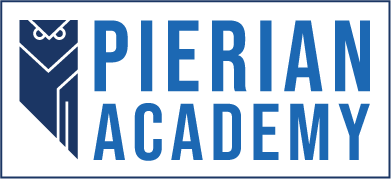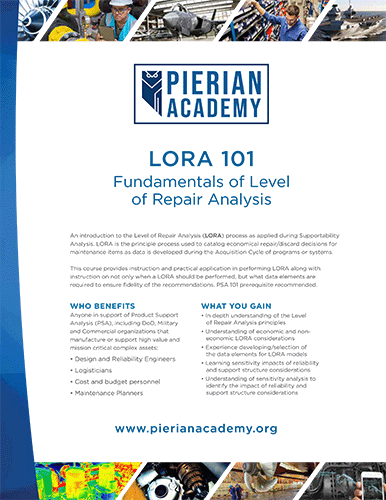Level of Repair Analysis (LORA) Training
The Standard for Excellence
About Level of Repair Analysis Training
Level of Repair Analysis (LORA) training teaches analytical methods used to determine where (level and/or location), and how analyzed equipment is best repaired, replaced, and/or discarded based on cost and operational availability requirements.
LORA applies to all equipment life cycle phases including research and development, systems acquisition, operations & support, and modification.
Applicable industries include, but are not limited to, Aerospace & Defense, Manufacturing, Pharmaceutical, Food Processing, Chemical Processing, Mining, Facilities, Weapon Systems, Agriculture, Alternative Energy, Energy Distribution, and Power Generation.
The Goal
Level of Repair Analysis (LORA) aims to minimize life-cycle costs through optimized maintenance, repair, and obsolescence scheduling. LORA assists in determining how a system or component will be supported and suggests who can and will make which repairs, under what circumstances, and where the repairs will take place.
LORA helps supportability and logistics engineers plan for optimal repair decisions tiered layers of systems, assemblies, and sub-assemblies in complex support environments that include multiple levels of maintenance capability such as field maintenance, centralized repair, depot repair, and vendor/OEM shops. Considerations for Level of Repair Analysis (LORA) include the cost of equipment to analyze component operations/repairs, the skill level of staff in assessing and repairing equipment, warehousing of parts, transportation time and costs, and operational facilities to complete repairs and testing. The LORA process sometimes finds that repairing a part may cost hundreds of times the replacement cost when the all costs of repair are considered, making equipment far costlier to repair than discard.
Learn the principles used to implement and improve cost-effective maintenance programs with a logical and comprehensive SAE AS1390 compliant LORA process.
SAE AS1390
(Society of Automotive Engineers)
The technical standard: Level of Repair Analysis (LORA)
AS1390 establishes the standard of requirements of the activities involved in the performance of LORA during the life cycle of equipment. Completing the activities in a logical order and iterative fashion comprises the LORA process.
Cost models calculate all the possible iterations of maintenance, repair, and replace options and determine an optimal cost solution for each case.
LORA is performed in two steps:
- Establish noneconomic decision criteria to make the initial support decisions
- Evaluate an economic model to determine the most cost-effective alternative to provide support for the system
The LORA system identifies options for
Organizational or O-level maintenance is indicated to take place at the organizational unit level and prioritizes quick turn-around for maximum operational availability. Generally, O-level consists of Repair-in-place (RIP) procedures using spare inventory components when failed components can be removed and replaced (R&R).
Intermediate or I-level maintenance requires a backshop or other off-site operating base. Repairs are more specialized and usually require more diagnostic equipment. Spare parts are known as bench stack at the intermediate level.
Depot or D-level maintenance occurs at specialized shops or original equipment manufacturer (OEM) facilities. Equipment overhauls and re-manufacturing is done at the D-level.
The LORA system indicates, first, “where” repairs take place and may be a tiered system.
The outcome is a systemic maintenance program that prioritizes up-time and efficiency at the lowest cost.
What You Will Learn:
- Economic LORA evaluation – the process to identify the most cost-effective maintenance concept for candidate equipment
- Level of Repair Analysis – the method by which maintenance levels are established based on limits obtained through evaluation of economic, non – economic, and operational readiness qualifications
- Creation of the LORA candidates list – deciding which components to analyze
- Noneconomic LORA evaluation – identifying preemptive considerations which override cost factors
- Ascertaining risk – tools to measure future uncertainty defined by cost and performance
- Sensitivity evaluation – determining the extent to which model parameter estimates fluctuate
- Maintenance planning and its relevance to LORA
- Reliability engineering and its impact to LORA
- Provisioning and life-cycle costs based on LORA decisions
Types of LORA Training
Level of Repair Analysis (LORA) is a comprehensive introductory course covering the process of LORA, its benefits, limitations, and optimal implementation. The preliminary course introduces broad concepts of Supportability Analysis and identifies options for location of maintenance, including combinations of levels to achieve maximum cost-effectiveness. The outcome is a systemic maintenance program prioritizing up-time and efficiency at the lowest cost.
LORA 101 Fundamentals of Level of Repair Analysis
Benefits of LORA Training
- Understanding of PSA disciplines as they relate to developing effective maintenance programs
- Theory and practical experience needed to implement and perform Level of Repair Analysis
- Experience developing effective repair management strategies
- An understanding of LORA’s role within asset management
- Ability to identify opportunities that may warrant a more in-depth analysis
Who is LORA for?
LORA training is beneficial to the military, municipal & commercial sectors, specifically:
- Fleet/asset managers
- Maintenance planners/managers
- Reliability managers/engineers
- Field service representatives
- Logisticians
- Maintenance technicians
- Supportability professionals
LORA Class Modules
LORA 101
Module 1 – Introduction to the LORA Process
Module 2 – Level of Repair Analysis in the Program Life Cycle
Module 3 – LORA Program Activities
Module 4 – Data & Evaluations
Module 5 – Data Mining for LORA and Class Quiz
Module 6 – Level Of Repair Analysis (LORA) Modeling Tools
Module 7 – LORA 101 Course Summary
Choose Your LORA Training
LORA Training 101
Fundamentals of Level of Repair Analysis
An introduction to the Level of Repair Analysis (LORA) process as it is applied for use in a Supportability Analysis. The course provides instruction and practical application in performing LORA processes along with instruction on when a LORA should be performed considering both economic and operational environment criteria for optimization. Intended for anyone performing LORA in support of Product Support Analysis (PSA).
Prerequisite: None
Course Duration: 3 Days
Cost: $999 per student

